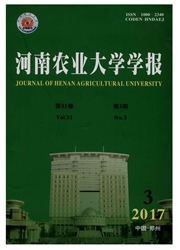

 中文摘要:
中文摘要:
结果表明,小菜蛾(Plutella xylostella L.)幼虫被菜蛾盘绒茧蜂(Cotesia plutellae (Kurdjumov))寄生后,不能正常化蛹,寄主的脂肪体细胞变态受到明显的抑制,在多分DNA病毒(Polydnavims,PDV)、畸形细胞等寄生因子存在状态下,经蛋白质双向电泳分析表明,不同寄生状态的小菜蛾脂肪体蛋白组分存在明显差异,与正常发育的寄主脂肪体完全不同,说明菜蛾盘绒茧蜂PDV、畸形细胞以不同的调控方式影响寄主脂肪体的蛋白合成和积累。以满足寄主体内幼蜂发育对营养的需求。
 英文摘要:
英文摘要:
The results of study showed, when parasitized by the Cotesia plutellae (Kurdjumov), not only the host larvae of Plutella xylostella L. were unable to pupate, but also their fat body metaporphism was physio-logically inhibited. The results of two-dimensional protein electrophoresis showed that protein compositions were different under different effects of parasition factors, such as polydnavirus (PDV), teratocytes and so on. Obviously, the PDV and teratocytes played different roles in inhibiting fat body protein accumulation in order to provide nourishment for developing parasitoid larva.
 同期刊论文项目
同期刊论文项目
 同项目期刊论文
同项目期刊论文
 期刊信息
期刊信息
